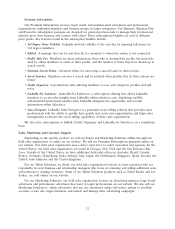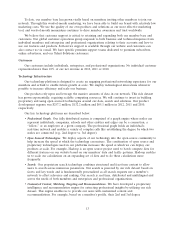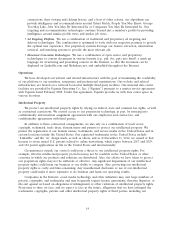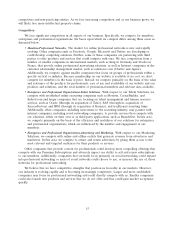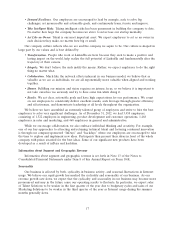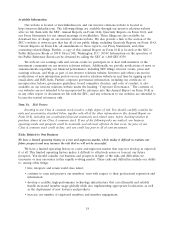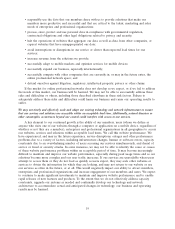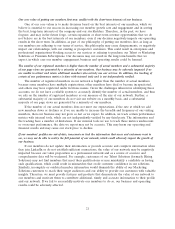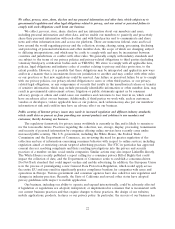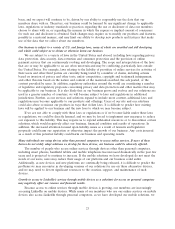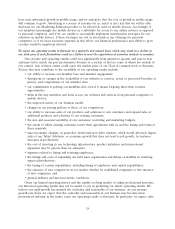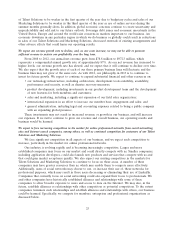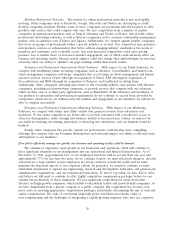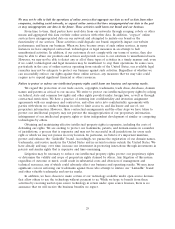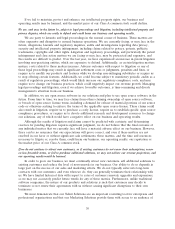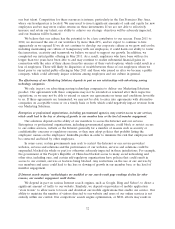LinkedIn 2012 Annual Report Download - page 24
Download and view the complete annual report
Please find page 24 of the 2012 LinkedIn annual report below. You can navigate through the pages in the report by either clicking on the pages listed below, or by using the keyword search tool below to find specific information within the annual report.We collect, process, store, share, disclose and use personal information and other data, which subjects us to
governmental regulation and other legal obligations related to privacy, and our actual or perceived failure to
comply with such obligations could harm our business.
We collect, process, store, share, disclose and use information about our members and users,
including personal information and other data, and we enable our members to passively and proactively
share their personal information with each other and with third parties and to communicate and share
news and other information into and across our platform. There are numerous federal, state and local
laws around the world regarding privacy and the collection, storing, sharing, using, processing, disclosing
and protecting of personal information and other member data, the scope of which are changing, subject
to differing interpretations, and which may be costly to comply with and may be inconsistent between
countries and jurisdictions or conflict with other rules. We generally comply with industry standards and
are subject to the terms of our privacy policies and privacy-related obligations to third parties (including
voluntary third-party certification bodies such as TRUSTe). We strive to comply with all applicable laws,
policies, legal obligations and industry codes of conduct relating to privacy and data protection, to the
extent possible. However, it is possible that these obligations may be interpreted and applied in new ways
and/or in a manner that is inconsistent from one jurisdiction to another and may conflict with other rules
or our practices or that new regulations could be enacted. Any failure or perceived failure by us to comply
with our privacy policies, our privacy-related obligations to users or other third parties, or our privacy-
related legal obligations, or any compromise of security that results in the unauthorized release or transfer
of sensitive information, which may include personally identifiable information or other member data, may
result in governmental enforcement actions, litigation or public statements against us by consumer
advocacy groups or others and could cause our members and customers to lose trust in us, which could
have an adverse effect on our business. Additionally, if third parties we work with, such as customers,
vendors or developers, violate applicable laws or our policies, such violations may also put our members’
information at risk and could in turn have an adverse effect on our business.
Public scrutiny of Internet privacy issues may result in increased regulation and different industry standards,
which could deter or prevent us from providing our current products and solutions to our members and
customers, thereby harming our business.
The regulatory framework for privacy issues worldwide is currently in flux and is likely to remain so
for the foreseeable future. Practices regarding the collection, use, storage, display, processing, transmission
and security of personal information by companies offering online services have recently come under
increased public scrutiny. The U.S. government, including the White House, the Federal Trade
Commission and the Department of Commerce, are reviewing the need for greater regulation of the
collection and use of information concerning consumer behavior with respect to online services, including
regulation aimed at restricting certain targeted advertising practices. The FTC in particular has approved
consent decrees resolving complaints and their resulting investigations into the privacy and security
practices of a number on-line, social media companies. Similar actions may also impact LinkedIn directly.
The White House recently published a report calling for a consumer privacy Bill of Rights that could
impact the collection of data, and the Department of Commerce seeks to establish a consensus-driven
Do-Not-Track standard that could impact on-line and mobile advertising. In addition, the European Union
is in the process of promulgating a new General Data Protection Regulation, which would apply across
the entire EU and may result in significantly greater compliance burdens for companies with users and
operations in Europe. Various government and consumer agencies have also called for new regulation and
changes in industry practices. Recently, the State of California and several other states have adopted
privacy guidelines with respect to mobile application.
Our business, including our ability to operate and expand internationally, could be adversely affected
if legislation or regulations are adopted, interpreted, or implemented in a manner that is inconsistent with
our current business practices and that require changes to these practices, the design of our websites,
mobile applications, products, features or our privacy policy. In particular, the success of our business has
22


